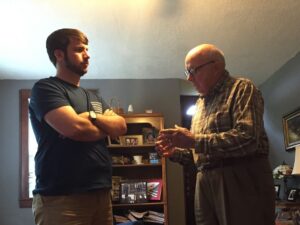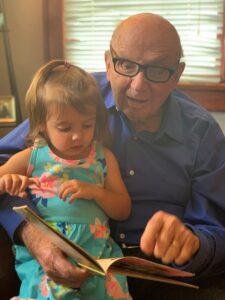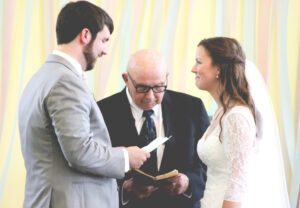
Ted Duffey, My Granddaddy
One of the most striking memories of my childhood is one of horror.
I was somewhere between five and eight years old. Maybe less, maybe more. It’s one of those memories that is caught in the blur of childhood that remembers moments and tastes and smells and fears and hopes, but not dates.
 My grandfather, Thomas Earl Duffey, otherwise known as “Ted,” got caught behind his tractor while working on it. If he moved, it threatened to roll back on him. I just happened to be in the yard near one of the several sheds on their property where he would work. When I heard him yell, I ran to get my grandmother. With Ted’s help, she was able to move the tractor and he was safe. This moment formed an indelible image in my young mind: Despite the danger that surrounded him, my grandfather was calm and collected—even in urgent situations. That’s something I’ve never forgotten. And it’s just one of many things that, in my opinion, testify to his sainthood.
My grandfather, Thomas Earl Duffey, otherwise known as “Ted,” got caught behind his tractor while working on it. If he moved, it threatened to roll back on him. I just happened to be in the yard near one of the several sheds on their property where he would work. When I heard him yell, I ran to get my grandmother. With Ted’s help, she was able to move the tractor and he was safe. This moment formed an indelible image in my young mind: Despite the danger that surrounded him, my grandfather was calm and collected—even in urgent situations. That’s something I’ve never forgotten. And it’s just one of many things that, in my opinion, testify to his sainthood.
Ted was “Granddaddy” to me and his 11 other grandchildren. But to the vast majority of Benton County, Tennessee, he was “Brother Ted.”
Born into a family of West Tennessee sharecroppers near the very beginning of the Great Depression in 1929, he eventually became an ordained minister and public school teacher. I can only imagine how many sermons he preached, how many weddings he performed, and how many funerals and burials he presided over. But what I can say is that simply watching him formed my faith and understanding of Christianity. He was a mountain of a man. Yet, his mountain wasn’t hewn of extraordinary strength, towering intellect, or unapproachable success. (Though he was strong, smart as a whip, and successful.) His was a mountain of gentleness, love, care, and wisdom.
 In one of the last meals we shared together, Bree asked him, “What’s the secret to making it to 90 years old?” His reply? “Never say anything bad about anyone.”
In one of the last meals we shared together, Bree asked him, “What’s the secret to making it to 90 years old?” His reply? “Never say anything bad about anyone.”
Sure, that’s a simple answer. But, for me, its power lay in the fact that he lived it. I had never heard him utter a negative word about a single person. Not a one. In his life, all of us who loved him saw the fruit of the spirit. A few memories reveal that.
There was the time that I, with the smugness that only teenagers can feel, referred to a teacher by an unsavory term at the dinner table. Granddaddy asked me if I knew what the word meant. I said no, not knowing exactly, but certainly knowing it wasn’t good. He wryly suggested that I keep a pocket dictionary on me from then on.
There was the time that I was clotheslined in a high school basketball game. He managed to run onto the court and get himself ejected by saying, “Ref, you’ve got to get this game under control.” I can only imagine that his kindness and reasoned demeanor unnerved the referees, who weren’t used to either of those things from fans.
 When Granddaddy married Bree and me in 2015, he pronounced us “Mr. and Mrs. Charles Kelby Duffey.” We both glanced at him nervously, and he knew he had misspoken. In classic Ted fashion, he announced, “I just wanted to get some of my history in there.”
When Granddaddy married Bree and me in 2015, he pronounced us “Mr. and Mrs. Charles Kelby Duffey.” We both glanced at him nervously, and he knew he had misspoken. In classic Ted fashion, he announced, “I just wanted to get some of my history in there.”
But, as I hope he knew, he needn’t worry about that. He’s one of the men that made me. And I can only hope to be a fraction of the man he was. The irony is, of course, he’d be the first to disavow that. Granddaddy didn’t just know the Gospel. He didn’t just preach it. He inhabited it. Like Paul, he would have considered himself chief among sinners.
Ted died the day before Thanksgiving in 2021 at the ripe age of 92.
In the innocence of childhood, you don’t quite understand when your grandfather is a saint. But in adulthood, you see it. You see the mark of difference that’s unexplainable in any way other than the love and grace and light of Jesus Christ.
Now, as the Psalmist says, his heart is glad and his soul rejoices and he rests in hope (Psalm 16:9).
Charles Snow

